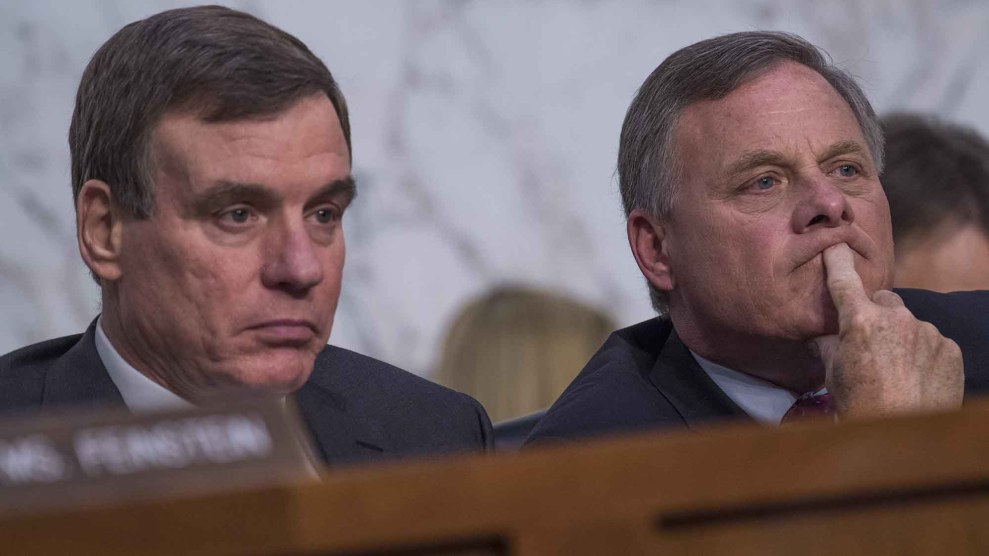
Senate Intel Chairman Richard Burr, R-N.C., right, and Vice-Chair Mark Warner, D-Va.Tom Williams/ZUMA
Every year, Congress has to reauthorize billions of dollars in spending by America’s 17 intelligence agencies. This year’s legislation, which recently passed the Senate Intelligence Committee, might contain some unpleasant surprises for President Donald Trump.
Along with funding for various intelligence-related operations and pay increases for certain cyber positions, the bill includes a half-dozen or so provisions related to Russian meddling in the 2016 presidential election. Among other things, the bill mandates that the intel agencies take a thorough look at the 2016 Russian operation, conduct an assessment of threats to state election systems, and formulate a “whole-of-government” strategy for countering Russian cyberattacks on electoral systems. The bill also contains a provision that would prevent the Trump administration from setting up a cyber working group with the Russian government without notifying Congress first. (There were signs earlier this year that the administration might set up such a group, but the president promptly walked that back.)
From a policy perspective, the bill’s provisions would seem to make sense, given that the US intelligence community has concluded that Russia interfered with the election in order to help Trump. Special counsel Robert Mueller is currently investigating whether Trump associates cooperated with Kremlin efforts. But the legislation also appears to be a direct slap at Trump, who has routinely dismissed the Russia scandal as “fake news” and “all a big Dem HOAX” designed to help the Democrats explain how they lost the presidential election.
The White House did not respond to a request for comment on the bill, and the office of Sen. Richard Burr (R-N.C.), who chairs the committee, did not return requests for comment.
“These provisions begin to respond to Russia’s ongoing threat to American democracy,” committee member Sen. Ron Wyden (D-Ore.) told Mother Jones. “The president has made clear that he won’t stand up to Russia’s aggression toward our democratic institution, so it’s encouraging that the Intelligence Committee is including common-sense provisions in the Intelligence Authorization act.”
The bill is still a long way from passage, but for now, observers say, its focus on Russia is hard to miss. “It is very Russia-heavy; there is no doubt about it,” says Michael Sulmeyer, project director of the Belfer Center Cyber Security Project at the Harvard Kennedy School and a former cyber policy official in the Defense Department. “It’s not like there’s a bunch of reports on Russia, and a bunch of reports on China, and a bunch of reports on North Korea.”
The committee, Sulmeyer adds, “may also be trying to send a message not just to the administration, but the intelligence community as a whole, that [Congress] for the year ahead [will have] a lot more focus and oversight on any and all issues related to Russia.”
Sulmeyer acknowledged that there are already multiple congressional investigations into possible connections between Trump associates and the Russian meddling efforts, not to mention Mueller’s probe. But by requiring a slew of additional reports from the intelligence community, Congress would be adding a layer of seriousness that can’t be ignored.
“There is nothing like a legal requirement to send a document, with a deadline in law, to focus the mind,” he says. “That is stuff you do not want to be late on.”
Here are some of the proposed requirements that are likely to get the president’s attention:
- Within 60 days of the bill becoming law, the undersecretary of homeland security for intelligence and analysis would have to submit to Congress a report on “cyber attacks and attempted cyber attacks by foreign governments on United States election infrastructure in states and localities in connection with the 2016 presidential election,” and on any similar anticipated attacks.
- Within a year of the bill becoming law, the director of national intelligence would have to submit a report to Congress analyzing what the US intelligence community did and didn’t do with respect to gathering information about what the Russian government was planning to do during the 2016 US presidential election.
- No later than 90 days after the bill becomes law, the director of national intelligence, in conjunction with the FBI, the CIA, and the National Security Agency, would be required to “develop a whole-of-government strategy for countering the threat of Russian cyber attacks and attempted cyber attacks against electoral systems and processes in the United States.”
- A provision of the bill would bar the president from setting up a joint cyber working group with the Russian government unless the president notifies Congress 30 days before the working group commences and lays out the purpose of the group, what information will be shared between the two governments, what the US government hopes to get from working within such a group, and the intelligence risks of doing such a thing. After Trump and Russian President Vladimir Putin met in July at the G-20 summit in Hamburg, Germany, Russian Foreign Minister Sergey Lavrov said the two nations had agreed to set up a joint cyber security working group. Soon after, Trump tweeted that he’d discussed the idea but that “doesn’t mean I think it can happen.”
- No later than 180 days after the bill becomes law, the director of national intelligence would have to submit to Congress a report assessing the “threat of Russian money laundering to the United States.” Former Trump campaign chairman Paul Manafort is reportedly under scrutiny for potential money laundering. Manafort has denied any wrongdoing.
- The director of national intelligence would be required to notify the leaders of the congressional intelligence committees “each time…there is credible information that a foreign power has, is, or will attempt to employ a covert influence or active measures campaign.” Russian influence operations are referred to as “active measures.”
Read the full text of the bill below:













